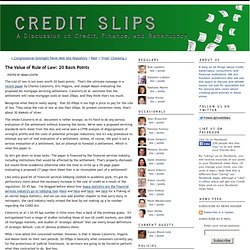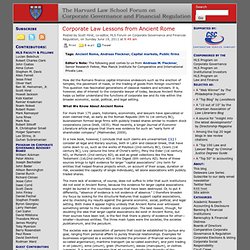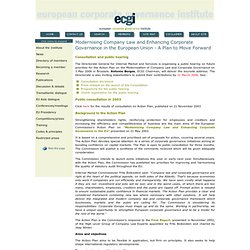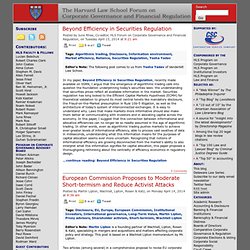

The Value of Rule of Law: 20 Basis Points. The rule of law is not even worth 20 basis points.

That's the ultimate message in a recent paper by Charles Calomiris, Eric Higgins, and Joseph Mason evaluating the proposed AG mortgage servicing settlement. Calomiris et al. estimate that the settlement will raise mortgage costs at least 20bps, and they think that's too much. Recognize what they're really saying: that 20-45bps is too high a price to pay for the rule of law. They value the rule of law at less than 20bps. At present conversion rates, that's about 30 shekels of silver. The whole Calomiris et al. document is rather strange, as it's hard to do any serious evaluation of the settlement without knowing the terms. So let's get down to brass tacks. Like every good bit of financial services lobbying clothed in academic garb, it's got its perfunctory claim about the necessary increase in the cost of credit as a result of the regulation: 20-45 bps.
Calomiris et al.' There's lots of other whacky claims in the document too. Corporate Law Lessons from Ancient Rome. Editor’s Note: The following post comes to us from Andreas M.

Fleckner, Senior Research Fellow, Max Planck Institute for Comparative and International Private Law. How did the Romans finance capital-intensive endeavors such as the erection of temples, the pavement of roads, or the trading of goods from foreign countries? This question has fascinated generations of classical readers and scholars. It is, however, also of interest to the corporate lawyer of today, because Ancient Rome helps us better understand the functions of corporate law and its role within the broader economic, social, political, and legal setting. What We Know About Ancient Rome For more than 175 years, historians, economists, and lawyers have speculated or even claimed that, as early as the Roman Republic (6th to 1st century BC), businessmen formed large firms with publicly traded shares similar to modern stock corporations (since Orelli, 1835). What We Can Learn from Ancient Rome. US Supreme Court Cases from Justia & Oyez.
GovernanceMetrics International. Modernising Company Law and Enhancing Corporate Governance in the European Union - A Plan to Move Forward. Modernising Company Law and Enhancing Corporate Governance in the European Union - A Plan to Move Forward Consultation and public hearing The Directorate General for Internal Market and Services is organising a public hearing on future priorities for the Action Plan on the Modernisation of Company Law and Corporate Governance on 3 May 2006 in Brussels.

Antonio Borges, ECGI Chairman, will deliver the keynote address. The Directorate is also inviting stakeholders to submit their contributions by 31 March 2006. See: Consultation document. Corporate governance and the financial crisis. SSBI2009.pdf (application/pdf Object) Delaware Corporate Governance Blog. Center for Corporate Ethics and Governance. RAND > JIE > Centers & Initiatives > Center for Corporate Ethics and Governance Improving corporate ethics and public policy through objective, empirical research and analysis.

The RAND Center for Corporate Ethics and Governance, or CCEG, is committed to improving public understanding of corporate ethics, law, and governance, and to identifying specific ways that businesses can operate ethically, legally, and profitably at the same time. The CCEG is dedicated to three objectives: Creating more effective public policies Promoting more ethical, self-governing corporate cultures, and Improving public trust in the corporate world. News, Commentary & Events Surprise: Q and A with Dave Baiocchi and D.
Publications Hedge Funds Not a Primary Cause of the Financial Crisis, but Could Contribute to Systemic RiskSep 19, 2012Hedge funds did not play a pivotal role in the financial crisis compared to other agents, such as credit rating agencies, mortgage lenders, and issuers of credit default swaps. The Harvard Law School Forum on Corporate Governance and Financial Regulation. Editor’s Note: The following post comes to us from Guido Rossi, former Chairman of the Consob (Italian SEC), and Marco Ventoruzzo of Pennsylvania State University, Dickinson School of Law, and Bocconi University.

A recent and groundbreaking decision of the European Court of Human Rights (ECHR) in Strasburg might shatter the entire structure of the Italian and European regulation of market abuse (insider trading and market manipulations). The case is “Grand Stevens and others v. Italy”, and was decided on March 4, 2014. The facts can be briefly summarized as follows. In 2005, the corporations that controlled the car manufacturer Fiat, renegotiated a financial contract (equity swap) with Merrill Lynch. …continue reading: European Court of Human Rights Shakes Insider Trading Rules.
Veritas Executive Compensation Consultants. TCGD.